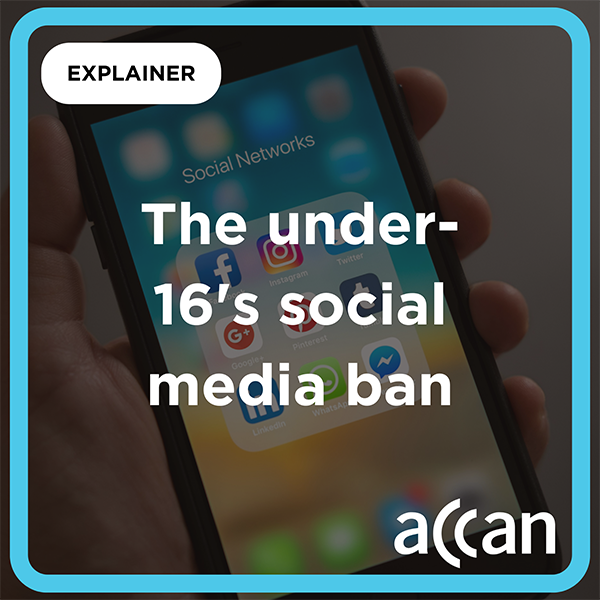Hot Issues
Welcome to the latest current affairs that impact communications consumers.
Sign up for ACCAN's weekly newsletter to have these news items sent to your email address each week.
[ List view | Detailed view ]
- Details
The opinion piece below was written by ACCAN CEO Carol Bennett for the Canberra Times and Australian Community Media. It was originally published on 7 June 2025.
Virtually every man, woman and teenager has a mobile phone. Ninety-eight per cent of adults use mobile phones for calls.
Read more: The billion-dollar industry with scant consumer protections
Write comment (0 Comments)- Details
The opinion piece below was written by ACCAN CEO Carol Bennett for the Canberra Times and Australian Community Media. It was originally published on 24 March 2025.
When our phones and internet are knocked out in natural disasters - such as occurred in the recent cyclone and flooding in northern NSW and south-east Queensland – it’s not just inconvenient, it puts lives at risk. Being disconnected makes it difficult to know what is happening, seek help – or even to offer help - support others and reassure family and friends.
Read more: Communications are critical: So why is the fox in charge of the henhouse?
Write comment (0 Comments)- Details
Australians deserve communications and digital services that are affordable, reliable, and deliver on their promises. Rising costs, a lack of transparency, and inadequate consumer protections are leaving many behind. We're campaigning for a fairer communications market, where everyone can afford to stay connected and digital platforms are held accountable. It's time for real action to ensure access to essential communication services isn't a privilege, but a right.
Read more: A fairer future for communications
Write comment (0 Comments)- Details
The opinion piece below was written by ACCAN CEO Carol Bennett for The Canberra Times and Australian Community Media. It was originally published on 29 January 2025.
One of the most important bills to come before the Federal Parliament prior to the looming election will be a proposed framework for preventing scams.
Ahead of the parliamentary debate there seems a lot of discussion about ensuring there are adequate protections - but for who?
Read more: New anti-scam laws are a rip off, unless you're a bank or big business
Write comment (0 Comments)- Details
The opinion piece below was written by ACCAN CEO Carol Bennett for the Canberra Times. It was originally published on 13 December 2024.
Australians will go to the polls in the first half of next year with the cost-of-living crisis dominating the political agenda.
The skyrocketing costs of essentials have hit people hard. The housing crisis has sent rents spiralling, and supermarkets have been accused of price gouging on essential food items. The eye-watering cost of electricity and other utilities is also hitting hard.
Read more: Essential communications unaffordable for too many
Write comment (0 Comments)- Details
The opinion piece below was written by ACCAN CEO Carol Bennett for the Sun Herald. It was originally published on 28 November 2024.
Imposing a ban on social media for those under 16 years of age won’t be simple and it certainly won’t be a silver bullet. But it is the right thing to do.
The government’s proposed ban has polarised policymakers, the media and experts. It has also become a 'play thing’ of the politicking that is now reaching a new levels as we approach an election in early 2025.
Read more: Four reasons for the social media youth ban
Write comment (0 Comments)- Details
 Background
Background
The government has proposed banning Australian children under the age of 16 from using social media platforms. If passed, children would no longer be able to use platforms such as:
- X (formerly Twitter)
- TikTok
- Snapchat
Read more: The under-16’s social media ban
Write comment (0 Comments)- Details
 The opinion piece below was written by ACCAN CEO Carol Bennett for the Canberra Times. It was originally published on 13 November 2024.
The opinion piece below was written by ACCAN CEO Carol Bennett for the Canberra Times. It was originally published on 13 November 2024.
Australian consumers can be forgiven for feeling angry and disgusted at the behaviour of Australia's second-largest telco - Optus - for mis-selling products to vulnerable consumers.
Australia's consumer watchdog has launched court action alleging that Optus rorted consumers by pushing the sale of products they did not want, need or understand, and pursued many for debts resulting from these sales.
Read more: Internet and phone access can be a matter of life and death
Write comment (0 Comments)- Details
On Friday 11 October, ACCAN CEO Carol Bennett and Deputy CEO Dr. Gareth Downing appeared before the Environment and Communications Legislation Committee. The Committee was hearing views on the Communications Legislation Amendment (Combatting Misinformation and Disinformation) Bill 2024.
The full transcript of their appearance can be found below, or on the Parliament of Australia website.
Read more: ACCAN Evidence to the Senate Hearing into Misinformation and Disinformation Laws
Write comment (0 Comments)- Details
The opinion piece below was written by ACCAN CEO Carol Bennett for the Canberra Times and Australian Community Media about draft anti-scams legislation. It was originally published on 27 September 2024.
Australians lost $2.7 billion to scams in 2023. These are scams we know about - the true losses are likely to be far greater.
The federal government has recently published draft scams prevention legislation (the Scams Prevention Framework), which will be put to the Parliament this year.
Read more: The government's scams prevention legislation has one critical flaw
Write comment (0 Comments)- Details
On 13 September 2024, ACCAN, the Consumer Action Law Centre, CHOICE and Super Consumers Australia welcomed an announcement from the Albanese Government that consultation on a draft bill - the proposed Scams Prevention Framework - will start today. The joint statement can be found below.
“I congratulate Assistant Treasurer Stephen Jones and the Albanese Government for pushing ahead with these scam reforms, and imposing tough obligations on industry to protect consumers, I want to thank him for this important work,” Consumer Action Law Centre CEO Stephanie Tonkin said.
Write comment (0 Comments)- Details
Notice is hereby given that the Annual General Meeting of the Australian Communications Consumer Action Network Limited (ACCAN) will be held via Zoom, on Thursday 26th September 2024 from 4pm.
Date: Thursday 26 September 2024
Time: 4pm (AEST)
Venue: Virtual Meeting via Zoom. Please register here by 24 September 2024
Read more: Notice of Annual General Meeting
Write comment (0 Comments)

